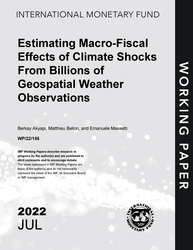
Estimating Macro-Fiscal Effects of Climate Shocks From Billions of Geospatial Weather Observations
Estimating Macro-Fiscal Effects of Climate Shocks From Billions of Geospatial Weather Observations
READ MORE...
Volume/Issue:
Volume 2022
Issue 156
Publication date: July 2022
ISBN: 9798400217203
$20.00
Add to Cart by clicking price of the language and format you'd like to purchase
Available Languages and Formats
| English |
Prices in red indicate formats that are not yet available but are forthcoming.
Topics covered in this book
This title contains information about the following subjects.
Click on a subject if you would like to see other titles with the same subjects.
Economics- Macroeconomics , Public Finance , Economics / General , Environmental Economics , Natural Disasters , climate , extreme weather , macro economy , big data , weather variable , weather shock , OLS estimation outcome , climate variable , weather data sources , Natural disasters , Climate change , Global , Middle East , Sub-Saharan Africa , East Asia , East Africa , GDP effect , weather observation
Summary
A growing literature estimates the macroeconomic effect of weather using variations in annual country-level averages of temperature and precipitation. However, averages may not reveal the effects of extreme events that occur at a higher time frequency or higher spatial resolution. To address this issue, we rely on global daily weather measurements with a 30-km spatial resolution from 1979 to 2019 and construct 164 weather variables and their lags. We select a parsimonious subset of relevant weather variables using an algorithm based on the Least Absolute Shrinkage and Selection Operator. We also expand the literature by analyzing weather impacts on government revenue, expenditure, and debt, in addition to GDP per capita. We find that an increase in the occurrence of high temperatures and droughts reduce GDP, whereas more frequent mild temperatures have a positive impact. The share of GDP variations that is explained by weather as captured by the handful of our selected variables is much higher than what was previously implied by using annual temperature and precipitation averages. We also find evidence of counter-cyclical fiscal policies that mitigate adverse weather shocks, especially excessive or unusually low precipitation episodes.
Copyright © 2010 - 2026
Powered by:
AIDC



